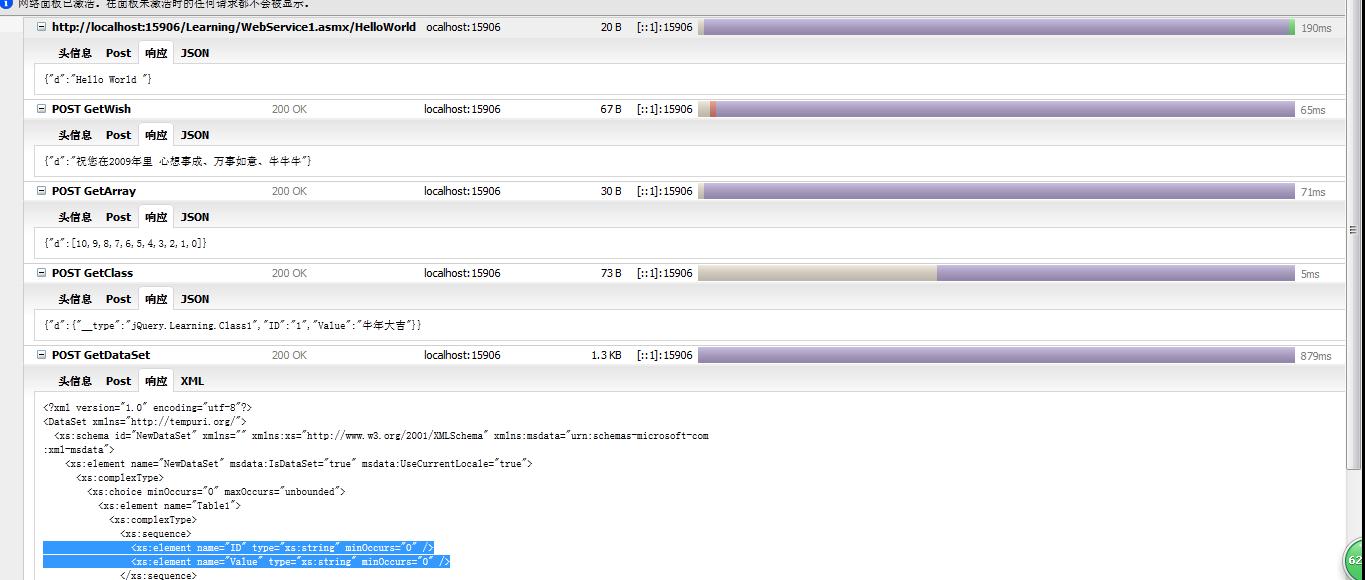ajax的访问 WebService 的方法
如果想用ajax进行访问 首先在web.config里进行设置
添加在
<webServices>
<protocols>
<add name= "HttpPost" />
<add name= "HttpGet" />
</protocols>
</webServices>
<system.web>节点之下
这样就是可以通过url进行访问了 不然就会报错
然后直接亮代码 代码也是网上找到的 如有雷同,请联系本人
[WebService(Namespace = "http://tempuri.org/")] [WebServiceBinding(ConformsTo = WsiProfiles.BasicProfile1_1)] [System.ComponentModel.ToolboxItem(false)] // 若要允许使用 ASP.NET AJAX 从脚本中调用此 Web 服务,请取消对下行的注释。 [System.Web.Script.Services.ScriptService] public class WebService1 : System.Web.Services.WebService { /// <summary> /// 无参数 /// </summary> /// <returns></returns> [WebMethod] public string HelloWorld() { return "Hello World "; } /// <summary> /// 带参数 /// </summary> /// <param name="value1"></param> /// <param name="value2"></param> /// <param name="value3"></param> /// <param name="value4"></param> /// <returns></returns> [WebMethod] public string GetWish(string value1, string value2, string value3, int value4) { return string.Format("祝您在{3}年里 {0}、{1}、{2}", value1, value2, value3, value4); } /// <summary> /// 返回集合 /// </summary> /// <param name="i"></param> /// <returns></returns> [WebMethod] public List<int> GetArray(int i) { List<int> list = new List<int>(); while (i >= 0) { list.Add(i--); } return list; } /// <summary> /// 返回一个复合类型 /// </summary> /// <returns></returns> [WebMethod] public Class1 GetClass() { return new Class1 { ID = "1", Value = "牛年大吉" }; } /// <summary> /// 返回XML /// </summary> /// <returns></returns> [WebMethod] public DataSet GetDataSet() { DataSet ds = new DataSet(); DataTable dt = new DataTable(); dt.Columns.Add("ID", Type.GetType("System.String")); dt.Columns.Add("Value", Type.GetType("System.String")); DataRow dr = dt.NewRow(); dr["ID"] = "1"; dr["Value"] = "新年快乐"; dt.Rows.Add(dr); dr = dt.NewRow(); dr["ID"] = "2"; dr["Value"] = "万事如意"; dt.Rows.Add(dr); ds.Tables.Add(dt); return ds; } } //自定义的类,只有两个属性 public class Class1 { public string ID { get; set; } public string Value { get; set; } }
然后是ajax的代码 <script type="text/javascript"> //无参数调用 $(document).ready(function() { $('#btn1').click(function() { $.ajax({ type: "POST", //访问WebService使用Post方式请求 contentType: "application/json", //WebService 会返回Json类型 url: "WebService1.asmx/HelloWorld", //调用WebService的地址和方法名称组合 ---- WsURL/方法名 data: "{}", //这里是要传递的参数,格式为 data: "{paraName:paraValue}",下面将会看到 dataType: 'json', success: function(result) { //回调函数,result,返回值 $('#dictionary').append(result.d); } }); }); }); //有参数调用 $(document).ready(function() { $("#btn2").click(function() { $.ajax({ type: "POST", contentType: "application/json", url: "WebService1.asmx/GetWish", data: "{value1:'心想事成',value2:'万事如意',value3:'牛牛牛',value4:2009}", dataType: 'json', success: function(result) { $('#dictionary').append(result.d); } }); }); }); //返回集合(引用自网络,很说明问题) $(document).ready(function() { $("#btn3").click(function() { $.ajax({ type: "POST", contentType: "application/json", url: "WebService1.asmx/GetArray", data: "{i:10}", dataType: 'json', success: function(result) { $(result.d).each(function() { //alert(this); $('#dictionary').append(this.toString() + " "); //alert(result.d.join(" | ")); }); } }); }); }); //返回复合类型 $(document).ready(function() { $('#btn4').click(function() { $.ajax({ type: "POST", contentType: "application/json", url: "WebService1.asmx/GetClass", data: "{}", dataType: 'json', success: function(result) { $(result.d).each(function() { //alert(this); $('#dictionary').append(this['ID'] + " " + this['Value']); //alert(result.d.join(" | ")); }); } }); }); }); //返回DataSet(XML) $(document).ready(function() { $('#btn5').click(function() { $.ajax({ type: "POST", url: "WebService1.asmx/GetDataSet", data: "{}", dataType: 'xml', //返回的类型为XML ,和前面的Json,不一样了 success: function(result) { //演示一下捕获 try { $(result).find("Table1").each(function() { $('#dictionary').append($(this).find("ID").text() + " " + $(this).find("Value").text()); }); } catch (e) { alert(e); return; } }, error: function(result, status) { //如果没有上面的捕获出错会执行这里的回调函数 if (status == 'error') { alert(status); } } }); }); }); //Ajax 为用户提供反馈,利用ajaxStart和ajaxStop 方法,演示ajax跟踪相关事件的回调,他们两个方法可以添加给jQuery对象在Ajax前后回调 //但对与Ajax的监控,本身是全局性的 $(document).ready(function() { $('#loading').ajaxStart(function() { $(this).show(); }).ajaxStop(function() { $(this).hide(); }); }); // 鼠标移入移出效果,多个元素的时候,可以使用“,”隔开 $(document).ready(function() { $('div.button').hover(function() { $(this).addClass('hover'); }, function() { $(this).removeClass('hover'); }); }); </script>
然后就是这5个ajax得到的响应

是不是很奇怪为什么json里都有个d 我也很奇怪估计是服务端把其他格式解析成json的时候自己添加的
还有一个问题 ajax的代码 contentType: "application/json", //WebService 会返回Json类型
dataType: 'json' 这2者的区别是啥 如果知道请告诉我下。
你们的评论、反馈,及对你们有所用,是我整理材料和博文写作的最大的鼓励和唯一动力。欢迎讨论和关注!
没有整理与归纳的知识,一文不值!高度概括与梳理的知识,才是自己真正的知识与技能。 永远不要让自己的自由、好奇、充满创造力的想法被现实的框架所束缚,让创造力自由成长吧! 多花时间,关心他(她)人,正如别人所关心你的。理想的腾飞与实现,没有别人的支持与帮助,是万万不能的。
没有整理与归纳的知识,一文不值!高度概括与梳理的知识,才是自己真正的知识与技能。 永远不要让自己的自由、好奇、充满创造力的想法被现实的框架所束缚,让创造力自由成长吧! 多花时间,关心他(她)人,正如别人所关心你的。理想的腾飞与实现,没有别人的支持与帮助,是万万不能的。




 浙公网安备 33010602011771号
浙公网安备 33010602011771号